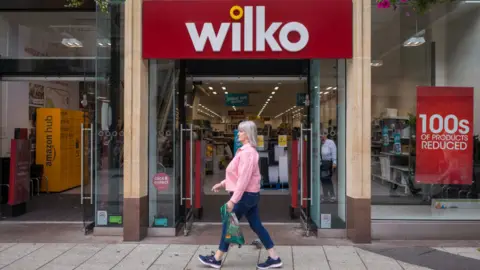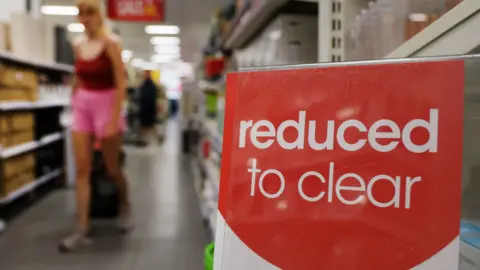What will happen next for Wilko and its workers?
 Getty Images
Getty ImagesWilko and its workers have had a tumultuous few weeks, with the well-known brand collapsing last month after struggling with losses.
Initial hopes that it could be saved soon faded after a bid by billionaire HMV owner Doug Putman to keep 300 stores afloat failed.
Wilko shops are to disappear from Britain's High Streets over the next few weeks.
Why did Wilko collapse?
Wilko ran out of time and money. No-one was prepared to stump up the £75m or so that was needed straight away to get the discount homeware chain back on track and pay suppliers to fill its sparse shelves.
The retailer has faced fierce competition in recent years from rivals B&M, Home Bargains, The Range and Poundland.
Many of its stores are also located in High Streets where costs are generally higher, whereas its competitors are often found in retail parks.
What will happen to the stores?
All 400 Wilko stores will close by early October, although some of the shops have already been snapped up by rivals and will reopen under their new brands in the future.
Discount chain B&M has bought 51 of Wilko's stores, although it has not yet specified which ones. It is expected to give more details on the deal in early November.
Meanwhile Poundland owner Pepco has agreed to take on 71 of Wilko's sites.
These stores will be converted to Poundland shops and are expected to open by the end of this year.
What will happen to the workers?
Nearly all of the company's 12,500 staff will lose their jobs.
Several retailers including Tesco, Aldi, Home Bargains, Toolstation and Dunelm have said Wilko staff can apply for jobs with them, with the latter saying Wilko employees will be guaranteed an interview.
Poundland has also said that former Wilko staff will have priority when applying for new jobs at the shops it has bought.
Wilko worker Josh Carruthers said staff in Nottinghamshire, where Wilko has its head office, were distraught at losing their jobs.
Fellow staff member Lauren Glacier said: "It is just very sad, I've got to think about my bills, I've got kids at home."
"That's the main worry really, [not] having that support and income which I'll sadly lose."
 EPA
EPAWhat will happen to the Wilko brand?
The Range, another rival chain, has bought the Wilko brand.
The deal means it will own Wilko's website and could choose to stock and sell some of its products.
Online operations are expected to restart in early October, and The Range plans to sell click-and-collect products from the Wilko.com website.
What does it mean for High Streets?
Wilko has been a stalwart of Britain's high streets for decades. For that reason, its collapse will have "significant implications" for other businesses, according to the British Independent Retailers Association.
Andrew Goodacre, chief executive of the trade body, said that High Streets "need reasons for people to visit", and larger retailers can provide these.
He added that large empty stores can become a "blight", giving the example of some Debenhams and BHS stores that have yet to be repurposed.
However, he added that some landlords and local authorities are showing "creativity" in schemes to encourage smaller independent retailers to use those spaces.
For Nzinga Zee Orgill, who works at The Brickhouse, a bar in Slough across the road from a Wilko shop, the long-standing store was "absolutely essential" for people in the area.
"It's a reason why people come to this part of the High Street, without it being here there are very little options left," she said.
Among Wilko's portfolio of shops are 20 that used to belong to Woolworths, a much-loved homeware retailer that went bust in 2008.
Now Wilko is following in the footsteps of Woolworths.
